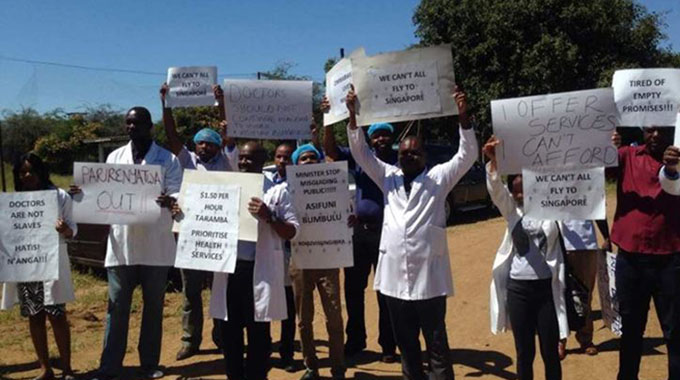It’s the lives of people that matter

Zvamaida Murwira Mr Speaker Sir
While it is refreshing to note that a month-long protracted industrial action by junior doctors has eventually come to an end, people cannot resist the temptation to reflect and count the cost of a trail of destruction through deaths and inconveniences occasioned by the industrial action.
Mr Speaker Sir, it will be recalled that most ambulance crews would advise patience in need of emergency treatment that the available option was to be taken to private hospitals and not public health centres owing to a paralysing industrial action by junior doctors.
Some departments at major Government hospitals such as Mpilo Central Hospital in Bulawayo had been shut down as a result of the strike.
It goes without saying, Mr Speaker Sir, that this kind of arrangement was untenable given the astronomic costs obtaining at private hospitals, who for all intents and purposes, are there to serve an elite client.
There is need, Mr Speaker Sir, to face the issue head on, considering that several lives were lost that could have been ordinarily saved as doctors and their employer, the Health Services Board had a stand-off and haggled over conditions of service.
It had to take the intervention of the highest office in the land where President Mnangagwa moved in to save the situation and at the end of it all normalcy was achieved.
After the strike, Mr Speaker Sir, there are several questions crying out for answers both from the striking doctors on one hand and the Health Service Board and the parent Ministry.
Was the industrial action the best way to have grievances addressed given that it left a trail of destruction where precious lives were lost?
Can one objectively go to sleep and feel contented by driving his or her point home in a manner that threatens the very lives he or she is sworn to serve?
Is it prudent for one to assert his or her constitutional right including the right to freedom of expression, if in exercising such a right, the sanctity of life is undermined?
On the other hand, for the employer, why would it take an industrial action for them to spring into action?
Can it rationally be said that HSB and the parent Ministry had no political will to resolve the challenge at hand, given the fact that the strike went on for more than a month with no solution in sight, given the irreparable damage it caused?
Mr Speaker Sir, it is imperative that the portfolio committee on Health and Child Care interrogates these issues with the aim of averting such problems in future.
It would also be recalled that Finance and Economic Development Minister Patrick Chinamasa at one time bemoaned the low uptake of the Health levy by the Ministry of Health and Child Care.
The timeous utilisation of the levy would have in some way addressed some of the grievances by the doctors to ensure the availability of such basic necessities such as gloves, and basic other amenities.
It is imperative, Mr Speaker Sir, that the committee on Health and Child Care chaired by Dr Ruth Labode, as part of its oversight role, interrogates what went wrong and how best to ameliorate the stand-off between health staff and their employers rather than wait for an industrial action whose effect, regrettably, is to paralyse the health delivery system.
Community Working Group on Health director Mr Itai Rusike bemoaned the strike by doctors saying it brought misery to the sick and quite a number died after failing to access health services.
“The month-long strike had a serious impact on the already strained health sector which does not have enough medical personnel, drugs and equipment. Never again should we put our people at risk by failing to dialogue and agree on issues of national importance,” he said.
He said Government needs to strengthen its labour dispute handling procedures for the essential services in order to avoid unnecessary pain, suffering and preventable deaths.
Mr Rusike hoped the agreement signed by the Government and the doctors would address the root causes of perennial job action and also take into consideration other health professionals.
Mr Speaker Sir, Mr Rusike’s views are no doubt, a reflection of the expectation of every Zimbabwean that there is need for Government to be pro-active in dealing with challenges for its workers.
Not only should Government be pro-active, but it should be seen to be taking a leading role in ensuring that normalcy returns to health institutions.
In some countries, relevant Ministers would abandon foreign trips and rush back home to attend to problems falling within their purview if they threaten human lives or national interest.
That did not seem to be the case in our present case as we have seen relevant authorities taking a “business as usual” approach despite people dying helplessly in hospitals before intervention by the highest office in the land.
The onus obviously does not lie with Government alone, but with health workers too, who have to regard and weigh the sanctity of life and possibly consider other methods to air their grievances rather than having lives being needlessly lost as the two parties bickered.
The doctors risked having people withdraw the possible sympathy that people might have on their grievances if it appears to them that they might be drawing “political capital” from the suffering of their patients to have their issues addressed.
After everything has been said and done, Mr Speaker Sir, there is need to give due weight to the lives of people in every circumstances either before people go on industrial action or in dealing with a crisis at hand on the part of the parent Ministry.








Comments